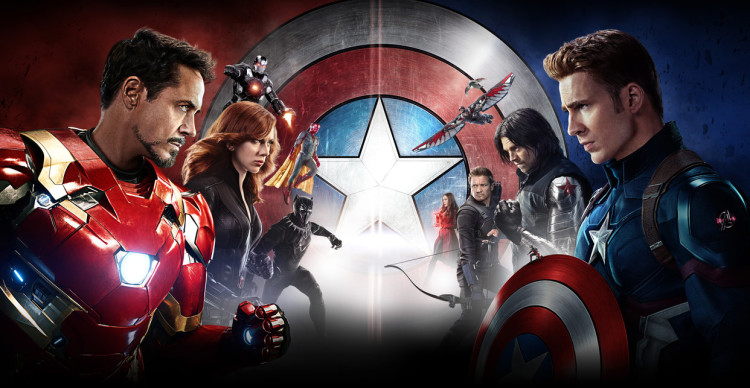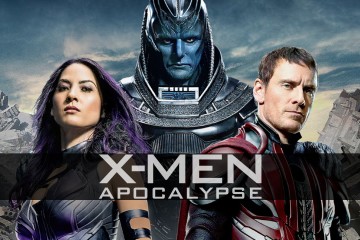Review: “Captain America: Civil War”

Editor's Rating
This review contains spoilers for Captain America: Civil War and was original posted here.
I thoroughly enjoyed Captain America: Civil War, but watching it with my wife, I was struck by a few major compromises the film made. The emotional and intellectual core of the movie was a validation of Marvel’s shared cinematic universe, but bowed to the pressures of future films. Thus, Civil War is an object lesson in the cost and payoff of Marvel’s cinematic universe.
A Solid Core
Steve Rogers, Captain America, has shared two major bromances. One, that runs through his standalone films, is with his lifelong friend turned superpowered Manchurian candidate, Bucky Barnes/Winter Soldier. The other, is with the eccentric and innovative billionaire, Tony Stark/Iron Man. These relationships developed in four other films. Their genuineness crackles on screen so strongly that even Marvel novices can sense the turmoil Steve Rogers faces between two diametrically opposite directions.
Captain America, when poorly handled, is Mr. Magoo with superpowers. A better understanding makes him makes him the personification of The Greatest Generation distilled into a Nazi-smashing super soldier. He fights for the American brand even when American politicians and its people are poisoned by fear. In Captain America: The First Avenger, America’s ideals and actions coincided harmoniously. The Red Skull was an existential threat to the ideals Captain America believed in and everything that America stood for. Captain America shared with his government and his own personal ideals. When revived, Captain America struggled to understand the modern world, but he knew that part adaptation was required. Captain America transitioned into a post-Avengers world where the governmental apparatus built to handle this brave new world, S.H.I.E.L.D., is revealed to be tainted with the corruption he fought against in the first movie. Institutional superheroism failed dramatically.
In the midst of this, Captain America’s relationship with Tony Stark in the Avengers movies represents befriending and trusting a dynamic changing Iron Man. It his relationship with Iron Man that helps Captain America understand modernity and realize that he even has a place in it. Tony Stark is brilliant and business-minded. He is a technological polymath that looks ahead without necessarily appreciating the present, but his heart is in the right place. Captain America is stoic and solid, but concerned with the right and wrong absolutely, aware but uncompromising of the logic endpoint of his stances.
The equal and opposite relationship is Steve Rogers to Bucky Barnes. Bucky is regressive and troubled. When Steve was an undersized kid, Bucky was his friend and protector. After being awoken in modern day, Bucky has become more weapon than man. Despite Bucky being a liability, Steve Rogers’ belief in personal choice and liberty, his feeling of obligation to Bucky, and his previous relationship with Bucky propels him into being Bucky’s champion and protector. Bucky Barnes is no weakling, but the Winter Soldier’s actions, however horrid, lack culpability. Steve Rogers’s loyalty to his old friend is labeled as a weakness or liability, but in fact, it is a testament to his old style strength of character. When expedient to jettison his loyalty or bend on the treatment of a friend he knows to be morally innocent, Steve Rogers has no ability to compromise. Iron Man represents the institutional concerns of the world, but Captain America does not believe morality can be bureaucratized.
This tension is ultimately the strength of the movie. Ostensibly, the Marvel Universe is the “real world” with the emergence of enhanced humans. With modern governments’ obsessive need for control, tracking, and information it’s absurd to imagine that altered humans would end up anywhere but under the supervision of some governmental entity. When the inevitable comes, of course Tony Stark is at the forefront trying to control the direction that oversight takes. On the other hand, Steve Rogers has serious qualms about governments controlling him or his friends. He witnessed firsthand the limitations of S.H.I.E.L.D and bureaucratic inaction.
Perhaps this philosophical difference and the strength of the Stark/Rogers friendship could have charted a compromise, but the injection of the Winter Soldier into their dynamic serves as an effective wedge between Captain America’s personal morality and Tony Stark’s institutional necessity. Of course Tony Stark sees this as a perfect example of the need for supervision. Rogue elements like the Winter Soldier suggest the need for oversight, regardless of his culpability. And, as noted before, Steve Rogers knows that the Winter Soldier isn’t “guilty” of intentionally committing his crimes. Thus, the collision course between allies is expertly set. Even so, the movie strains tying together the disparate plot elements and the need for Franchise, but this core is so strong that it supports a scaffolding that while enjoyable and well-crafted, is outside the core of the film.
Extraneous Characters
I must admit upfront that Spider-Man and Black Panther were excellent and faithful renditions of their characters. But they needlessly complicated a great movie with a massive runtime. For a big honking superhero fight, you need combatants. Ushering Thor and Hulk offstage was wise. Shuffling in Ant-Man was handled with wry humor and a minimum of script wrangling. It’s hard to say the same for Spider-Man and Black Panther.
Black Panther is in this movie as an introduction to the cinematic universe first and foremost. If Wakanda was never mentioned, could the movie have had the same core premise? Absolutely. Could Black Panther’s role, as a spoiler and personally invested foe of the Winter Soldier, been handled by an existing character? Again, yes.
Spider-Man is another nod to the need to sell the next movie in the current movie. Spider-Man’s depiction was the best cinema depiction of Spider-Man in film, but it was hard to justify his presence. Tony Stark’s decision to have an untrained teenager assist as a child soldier in combat against a rogue faction of superheroes was rash. As the culmination of the battle, with War Machine being crippled by a stray blast shows, despite the quips and camaraderie this was not a game.
In the end, kneeling at the altar of a shared movieverse is easily forgiven by a fan, but I can’t help but wonder if the movie would have zipped along better with those 20 minutes back or rededicating to the story’s weakest link: Helmut Zemo.
Serendipitous Villainy
Zemo is a strange villain. He is self-aware (gosh, The Avengers are too strong for me) and a insightful (wow,The Avengers always win). His basic villainous premise is that the only people that can destroy The Avengers are the The Avengers. That’s a fine concept for a foe. The problem comes in his execution. Other than set the table to put the Avengers against one another (using Bucky as a pawn to sow strife between Iron Man and Captain America) his inclusion in the movie really has nothing to do with the characterization that makes the inherent conflict so strong. I would loved to have seen Zemo somehow highlight the flaws in both sides of the superhero civil war. True, he could not fight the Avengers and win, but he could have revealed the churlishness of Captain America’s reluctance at oversight and Iron Man’s naivete in assuming that governmental control would lead to responsible behavior. Destroying the public’s faith in its heroes would have been an inspired flourish for Helmut Zero.
Instead, he takes a good premise and mostly succeeds through good fortune. It seemed incredible luck that he managed to infiltrate Bucky’s containment cell by easily replacing the credentialed psychiatrist. Further, it was unknowable that all three of the major characters in his scheme (Iron Man, Captain America, and the Winter Soldier) would end up in his retro bunker watching the damning assassination of the elder Starks. Overall, Helmut Zero was built on excellent premise, but given very little reason to make the audience believe he should have succeeded.
Conclusion
Critical Hit. If I can take my critic hat off, I have to admit I loved this film top to bottom. There are storytelling compromises made in the Name of Franchise, but I don’t mind long films or packed ones. This film is the epitome of the shared universe that Marvel built. Its execution and premise would have been deeply compromised without the excellent build up that hours worth of other movies established, but it was forced to deviate from its core to build new scaffolding for future films to build off of.
If you liked what read, you can download the first part of my serial novel The Great Game, Game On, entirely for free on Barnes & Noble, Smashwords, the Apple iBookstore, or for $0.99 onAmazon.
Show your support by leaving a review on Amazon or Barnes & Noble or Liking my author page.



No Comment